On June 18…
“In great deeds, something abides. On great fields something stays. Forms change and pass; bodies disappear, but spirits linger, to consecrate the ground for the vision-place of souls. And reverent men and women from afar, and generations that know us not and that we know not of, heart-drawn to see where and by whom great things were suffered and done for them.”
~Joshua Lawrence Chamberlain
At the dedication of the Maine monuments
Gettysburg 1889
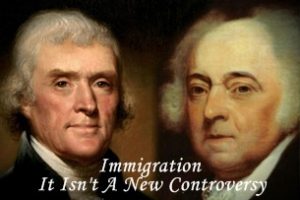
1798 – President John Adams signed the Naturalization Act of 1798, the first of four pieces of controversial legislation known together as the Alien and Sedition Acts.
The Naturalization Act raised the requirements for aliens to apply for U.S. citizenship, requiring that immigrants reside in the U.S. for 14 years before becoming eligible. The earlier law had required only five years of residence before an application could be made.
The Alien Act, signed on June 25, allowed the President to order any aliens he deemed dangerous to be deported. This included suspicion of treason or spying.
The Alien Enemies Act, enacted by Congress on July 6, allowed the wartime arrest, imprisonment and deportation of any alien subject to an enemy power, provided that the U.S. was in a declared war with a foreign nation or government.
The Sedition Act, passed on July 14, declared that any treasonable activity, including the publication of “any false, scandalous and malicious writing,” was a high misdemeanor, punishable by fine and imprisonment. By virtue of this legislation twenty-five men, most of them editors of Republican newspapers, were arrested and their newspapers forced to shut down.
Adams was a member of the Federalist Party and his colleagues in Congress asserted the acts were needed to shield the nation from threats by potential enemy powers seeking to weaken the fledgling U.S. government. But Democratic-Republicans, such as vice president Thomas Jefferson, attacked the laws as unconstitutional and aimed at muzzling critics of the administration.
Strong political opposition to these acts succeeded in undermining the Adams administration, helping Jefferson to win the presidency in 1800.
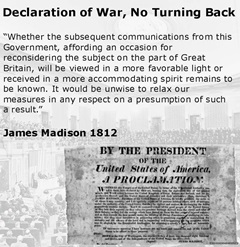
1812 – The day after the Senate followed the House of Representatives in voting to declare war against Great Britain, President James Madison signed the declaration into law, marking the start of the War of 1812.
The American war declaration, opposed by a sizable minority in Congress, had been called in response to the British economic blockade of France, the induction of American seaman into the British Royal Navy against their will, and the British support of hostile Indian tribes along the Great Lakes frontier.
A faction of Congress known as the “War Hawks” had been advocating war with Britain for several years and had not hidden their hopes that a U.S. invasion of Canada might result in significant territorial land gains for the United States. In the months after Madison’s declaration of war, American forces launched a three-point invasion of Canada, all of which were decisively unsuccessful.
Fun Fact: Madison (5′ 4″) was the shortest U.S. president and at 120 pounds, was also the slimmest. Yes, I know this fascinating piece of trivia has nothing to do with the War of 1812, but I thought you might like to know. If you didn’t, please forget you read it.

1815 – The Battle of Waterloo resulted in the defeat of Napoleon Bonaparte by the Duke of Wellington and Gebhard Leberecht von Blucher, forcing him to abdicate the throne of France for the second and last time.
It was one of the bloodiest battles of the pre-twentieth-century that saw nearly 200,000 men from seven nations take part in the action. From the firing of the first gun to Napoleon’s surrender nine hours later, 65,000 men were either dead or wounded.
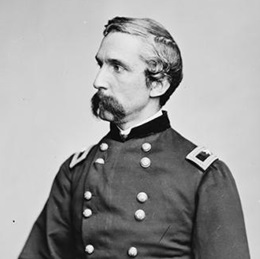
1864 – Union war hero Joshua Lawrence Chamberlain was severely wounded at Petersburg, Virginia, while leading an attack on a Confederate position. The wound was the most serious of the six he received during the Civil War.
As commander of the 20th Maine, he had earned distinction at the Battle of Gettysburg when he shored up the Union left flank and helped save Little Round Top for the Federals. In 1893, 30 years after the battle that made the 20th Maine famous, he was awarded the Congressional Medal of Honor for for “daring heroism and great tenacity.”
Chamberlain so impressed Ulysses S. Grant that he chose him to command the party receiving Confederate Gen. John Gordon at the formal surrender at Appomattox Court House in April 12, 1865. In a dramatic gesture of goodwill, as Gordon and his party approached, Chamberlain ordered his men to come to attention and “carry arms” as a show of respect.
Fascinating Trivia: The bullet that ripped through Chamberlain’s pelvis at Petersburg ruptured his bladder and severed his urethra. It mangled his guts beyond repair but it took 50 agonizing years before he finally succumbed to his injuries. But the suffering didn’t prevent him from further service to his state.
After the war, Chamberlain returned to Maine and was elected to four one-year terms as governor, and in 1871, he was appointed president of Bowdoin College and remained in that position until 1883.
A full study of his medical history strongly suggests that it was complications from the wound suffered at Petersburg that resulted in his death in 1914.
As reader (and fellow Civil War buff) Rob Goodrich notes, Chamberlain was the last Civil War veteran to die as a result of wounds from the war.
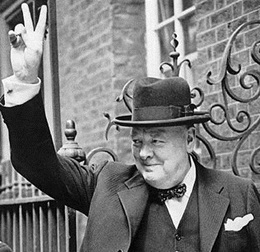
1940 – In 36 minutes of soaring oratory at the House of Commons, Winston Churchill – six weeks after becoming Prime Minister of the United Kingdom, and confronted with the threat of invasion from Nazi-occupied France – sought to rally his countrymen with what has gone down in history as his “finest hour” speech.
Only two weeks before the speech, British naval vessels and a fleet of privately owned fishing and pleasure boats had completed the evacuation of 338,000 British, French and other Commonwealth troops from the risk of annihilation by German forces on the beaches at Dunkirk.
The speech – ending with the words “Let us therefore brace ourselves to our duties, and so bear ourselves that if the British empire and its Commonwealth last for a thousand years, men will still say, ‘This was their finest hour‘” – has resonated ever since.
On both sides of the Atlantic and beyond, it has been hailed as the moment when Britain found the resolve to fight on after the fall of France, and ultimately, in alliance with American and Russian military might, to vanquish the German armies that had overrun most of Europe.
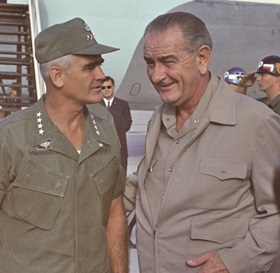
1966 – Gen. William Westmoreland, senior U.S. military commander in Vietnam, sent another new troop request to the Joint Chiefs of Staff. Westmoreland – apparently thinking there were no limits on the number of men he could have at his disposal – stated that he needed 542,600 troops for the war in Vietnam in 1967 – an increase of 111,600 men to the number already serving there.
In the end, President Lyndon Johnson once again acceded to Westmoreland’s wishes and dispatched the additional troops to South Vietnam, but the increases were done in an incremental fashion. The highest number of U.S. troops in South Vietnam was 543,500, which was reached in 1969.
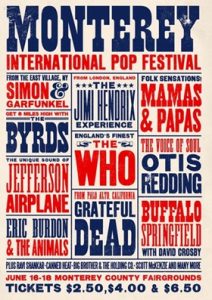
1967 – Held over three days during the height of the Summer of Love, the Monterey International Pop Festival came to a close with a final day lineup of Ravi Shankar, Big Brother & The Holding Company, Buffalo Springfield, The Who, Grateful Dead, Jimi Hendrix, Scott McKenzie, and the Mamas and Papas.
The Summer of Love that followed Monterey may have failed to usher in a lasting era of peace and love, but the festival introduced much of the music that has come to define that particular place and time.
Look at the poster again … How about those ticket prices!
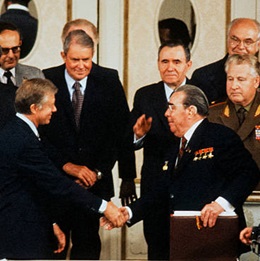
1979 – During a summit meeting in Vienna, President Jimmy Carter and Soviet leader Leonid Brezhnev signed the SALT-II agreement dealing with limitations and guidelines for nuclear weapons. The treaty, which never formally went into effect, proved to be one of the most controversial U.S.-Soviet agreements of the Cold War.
The treaty did little or nothing to stop, or even substantially slow down, the arms race. Nevertheless, it met with unrelenting criticism in the United States. The treaty was denounced as a “sellout” to the Soviets, one that would leave America virtually defenseless against a whole range of new weapons not mentioned in the agreement.
In December 1979, the Soviets launched an invasion of Afghanistan, effectively killing any chance of SALT-II being passed, and Carter ensured this by withdrawing the treaty from the Senate in January 1980. SALT-II thus remained signed, but unratified.
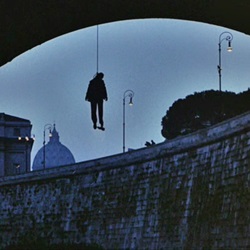
1982 – Roberto Calvi, the chairman of Italy’s second largest private bank, Banco Ambrosiano – and a man dubbed “God’s Banker” by the press because of his close association with the Catholic Church in Rome – was found hanging from the scaffolding beneath Blackfriars Bridge in London.
His death was ruled a murder after two coroner’s inquests and an independent investigation but no one was ever convicted.
Claims have been made that the Vatican Bank (Banco Ambrosiano’s main shareholder), the Mafia (which used Banco Ambrosiano for money laundering), and the clandestine pseudo-Masonic lodge Propaganda Due were somehow involved in Calvi’s death.
A heavily fictionalized version of Calvi appears in the film The Godfather Part III in the character of Frederick Keinszig.
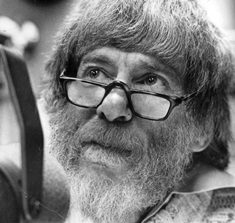
1984 – Talk radio icon Alan Berg, the self-described “man you love to hate,” was gunned down and killed instantly in the driveway of his home in Denver, Colorado.
The 50-year-old host, whose show on station KOA gained a strong following in the early 1980s, stirred up controversy with his outspoken personality, abrasive approach and liberal views.
David Lane and Bruce Pierce, two members of The Order – a neo-Nazi organization – were ultimately convicted, though neither of homicide (which is a state crime). Rather, they were convicted of racketeering, conspiracy, and violating Berg’s civil rights (which are federal crimes).
Lane’s sentence was 190 years (he died in 2007), while Pierce’s was 252 years. He died in 2010.
Berg’s story provided the loose inspiration for Oliver Stone and Eric Bogosian’s 1988 film Talk Radio.

1983 – In Florida, the space shuttle Challenger was launched into space on its second mission. Aboard the shuttle was Dr. Sally Ride, who as a mission specialist became the first American woman to travel into space. During the six-day mission, Ride, an astrophysicist from Stanford University, operated the shuttle’s robot arm, which she had helped design.

2000 – Actress Nancy Marchand, memorable for her portrayals of Margaret Pynchon on Lou Grant (she won four Emmy Awards as Best Supporting Actress in a Dramatic Series) and Livia Soprano on The Sopranos, died of cancer one day before her 72nd birthday.
Compiled by Ray Lemire ©2018 RayLemire.com. / Streamingoldies.com. All Rights Reserved.